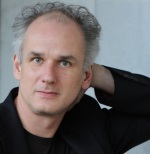ISMB/ECCB 2019 - Distinguished Keynote

Nikolaus Rajewsky
Max-Delbrück-Centrum for Molecular Medicine in the Helmholtz Association
Berlin-Buch, Germany
https://www.mdc-berlin.de/n-rajewsky
Presentation Title: Principles of gene regulation in space and time by single-cell analyses.
Time: Sunday, July 21, 6:30 pm - 7:30 pm
Room: San Francisco
Biography:
Nikolaus Rajewsky combines computational approaches (Informatics, Statistics, Theoretical Physics) with Biochemistry and Molecular Biology to study the function of RNA. His latest research using single-cell approaches has been featured in Science’s “Breakthrough of the year 2018”. Nikolaus is a member of numerous international advisory boards (for example of the "Human Cell Atlas”.) His peer‐reviewed publications have been cited more than 40,000 times. His research is or has been supported by grants from the EC, German Ministry of Science, Senate of Berlin, DFG, NIH, GIF, and others. He has given more than 170 invited talks at international meetings during the past few years. Nikolaus has initiated and directs a new branch of the MDC (a Helmholtz research center), the “Berlin Institute for Medical Systems Biology (BIMSB)”, endowed with permanent funding (18 Million Euros per year) and a new building in the center of Berlin. BIMSB has already recruited 17 group leaders, most of them from abroad. Nikolaus coordinates (together with G. Almouzni, Institute Curie) the “LifeTime” consortium, a pan-European consortium comprising ~90 research instiutions and ~80 companies. Lifetime wants to improve healthcare by maping, understanding, and targeting cells during disease. To achieve this, LifeTime integrates and applies single-cell multiomics, machine learning, and personalized disease models to human diesease progressions. Nikolaus is an EMBO member, a member of the German Academy of Sciences (“Leopoldina”) and has been awarded with Germany’s most prestigious research award, the Leibniz prize. He holds a PhD in Theroretical Physics (Cologne, Germany) and an honorary PhD in Human Biology and Medical Genetics by La Sapienza University, Rome.



